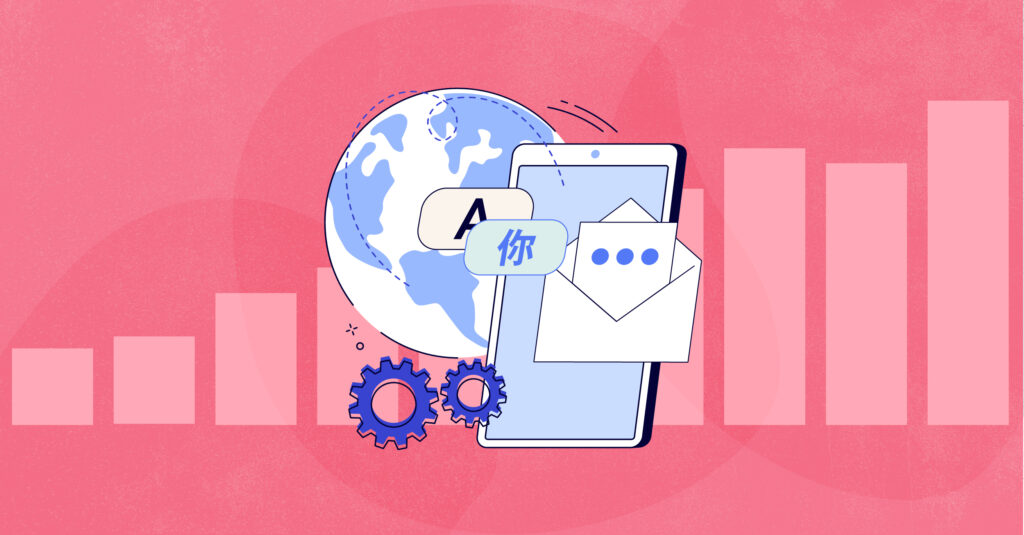When it comes to email marketing, the biggest hurdle you face is getting your customers to open your emails. On average, nearly four out of five marketing emails go unopened, largely because the companies sending them have failed to understand their audience or craft a subject line that speaks to them.
It shouldn’t be surprising, then, that simply personalizing a subject line with the recipient’s name can increase open rates by 50%. But, for many global brands, there’s another consideration involved: translation. If your subject line isn’t grabbing their attention, it may be that you’re not quite speaking their language (even if you think you are).
True email personalization involves more than just dropping in a customer’s name — you have to translate your copy into a message that resonates with them in one momentary glance.
What Causes Poor Email Open Rates?
There’s no single reason why your customers don’t open your emails, and any strategy for improving your open rates should take a multi-pronged approach. In reality, you only have half a second or so to grab someone’s attention as they scroll through their inbox, so you have to get creative with your multilingual marketing efforts.
According to research from CRM marketing firm Super Office, customers may ignore your emails for any of the following reasons:
- They’re not optimized for mobile, where 81% of emails are now opened.
- You send them at the wrong times – most emails are opened within the first hour, so timing is crucial.
- Your subject lines are too long – six to 10 words is the sweet spot.
- You haven’t properly segmented your audience, so the message is off-base or too generic.
More important than any of these, however, is the substance of your subject line. Apart from who the email is from, subject lines are the top reason your email gets opened or ignored. And for global brands, that often comes down to translation and localization.
Consider the fact that you only have around eight words and half a second to pique a customer’s interest. Those eight words are precious, and every single one matters. Maybe they worked great in English, but can you really count on a reliable word-for-word translation into a language and culture with which you’re far less familiar?
How to Personalize Email for Customers in Multiple Languages
With email marketing, the nuances of translation get thrown into the spotlight and success can hinge on the meaning of a single word. A word that has a clear meaning in English, for instance, may have multiple meanings in another, and the context of your subject may convey the wrong one.
Word choice is far from the sole consideration, either. Every language has myriad dialects, for example. Simply translating a subject from English into Spanish isn’t sufficient. Which dialect? Are you speaking to an audience in Mexico or Spain? These may require vastly different translations.
There are also factors like reading direction (left to right vs. right to left) or currencies and units of measurement to consider. Regulatory concerns may come into play, dictating what you can or can’t say in one context vs. another. The wrong word choice may even mean your email bounces before it ever gets to your new customer’s inbox.
On its face, translating a short subject line may seem simple. However, when you consider the many layers involved, you realize that achieving translation quality is anything but straightforward.
The Unbabel Solution: AI-Powered Email Localization With a Human Touch
As you grow your brand and expand into new markets with new customers, you may have hundreds of audience segments and dozens of languages to manage. It’s tempting to lean solely on artificial intelligence (AI) for the fastest and most efficient translations possible so you can get your messages out en masse. But, language is far too nuanced to leave such important translation work to AI alone. A single poorly chosen word may be enough to lose your new customers’ interest — or worse, offend them. The detail demanded by this type of translation calls for the speed of AI with a human touch, and that’s exactly what Unbabel provides.
Our unique blend of AI-based translation with human review by native speakers ensures high-quality multilingual marketing translations at scale. You can quickly translate your emails from your source language into multiple languages and localized versions, and our Quality Estimation tool will flag any issues that need proofreading before that copy lands in your customers’ inboxes.
Take Your Multilingual Email Marketing to the Next Level
The work of multilingual marketing is far more complex than simply translating copy from your native language into another. It requires a deep understanding of your target audience and what it means to localize your message to a new context and culture.
Translating email marketing messages at the scale of global business requires not only precision but also speed. You can’t afford to go without either, and that’s why Unbabel has designed marketing translation solutions that offer both. Get your emails out with the speed of machine translation and in the voice of a native speaker.
See what’s possible with your email campaigns. Check out our free demo.












